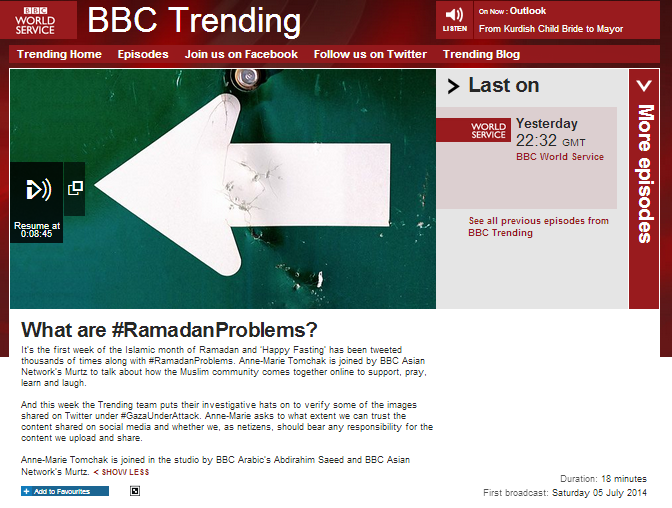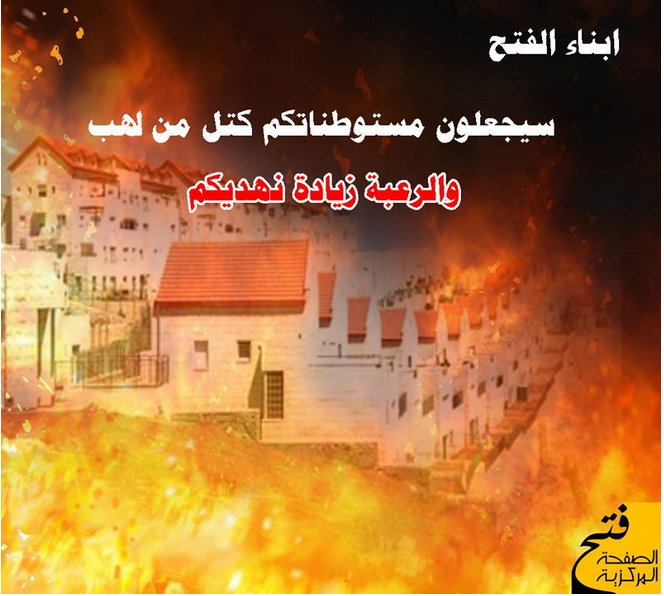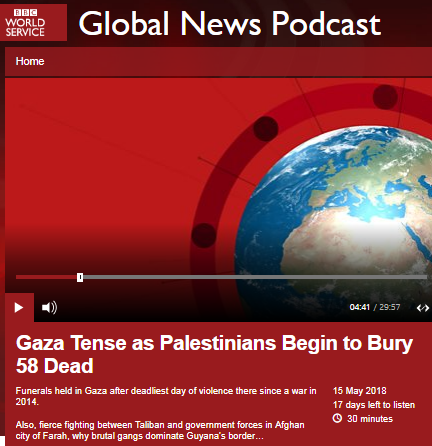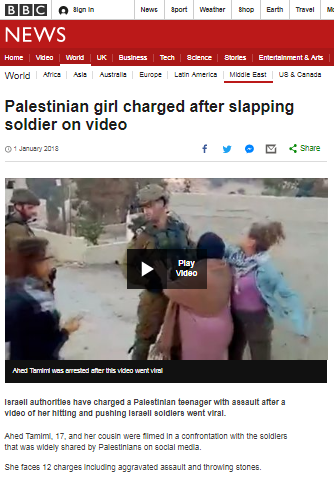The July 5th edition of the BBC World Service programme ‘BBC Trending’, presented by Anne-Marie Tomchak, included a discussion with BBC Arabic’s Abdiraheem Saeed on the topic of social media use and recent events in Israel and the PA controlled areas. The programme is available here, with the item beginning at around 01:25.
An abridged, filmed version of the item also appeared on the BBC News website on July 7th under the title “#BBCtrending: Are #GazaUnderAttack images accurate?“.
The audio item begins with an interesting presentation of recent events.
Anne-Marie Tomchak: “This week the hashtag ‘GazaUnderAttack’ has been trending. It’s been used more than 231 thousand time in the past seven days. But the hashtag itself isn’t new. It’s reappeared on social media because of fresh tensions between Israel and the Palestinians. Now earlier this week the bodies of three kidnapped Israeli youths were found in the West Bank. Israel has blamed Hamas, but they’ve denied responsibility. And then later in the week a Palestinian teenager was abducted and killed in Jerusalem. The deaths have fuelled tensions and sparked new clashes on the ground and it’s all moving really fast. Abdiraheem – can you just give us a sense of what’s happening as of when we’re recording this programme on Friday?”
Abdiraheem Saeed: “Yeah, so things kind of started on Monday when the bodies of the three Israeli teenagers were found around Hebron and they went missing about two weeks and a half ago and since then the city of Hebron has been locked down. Israel accuses Hamas of being behind the attack and has since launched a number of air attacks on Gaza, partly because it says there has been rocket attacks coming in from Gaza on Israeli cities.”
AMT: “Right, so rockets have been fired from Gaza into Israel and there’ve been Israeli airstrikes on Gaza and it’s those airstrikes on Gaza that are a part of the reason why this hashtag ‘GazaUnderAttack’ is trending.”
Let’s have a look at the messaging in this segment of the programme. Most notable is the misleading impression given to BBC audiences that “things kind of started on Monday”. In fact, a huge upsurge in the number of missile attacks by terrorist organisations from the Gaza Strip began immediately following the kidnappings of Gil-ad Sha’ar, Naftali Frenkel and Eyal Yifrach on June 12th, but there had also been several attacks before that date, including on June 1st and 2nd, June 7th, June 8th and June 11th. Since June 12th, over 150 missiles have hit southern Israel, but despite that, Saeed still presents those attacks in terms of “Israel says” and without informing listeners of the numbers involved.
Another notable feature is the attempt to tie Israeli responses to missile fire to the discovery of the bodies of the three Israeli teenagers and the implication that they are some sort of ‘punishment’ for Hamas involvement in the kidnappings and murders. Likewise, the use of the broad terms “airstrikes on Gaza” and “air attacks on Gaza” fails to clarify that the strikes target specific terror-related facilities – not “Gaza” as a whole – and hence misleads listeners.
Remarkably too, this item continues the line adopted by the BBC since it first began reporting on the kidnappings, according to which Hamas denials of involvement are amplified – despite the intelligence indicating otherwise – and no explanation is given as to why “Hebron has been locked down”: because the two main suspects who are still on the run originate from that city, which is one of Hamas’ main strongholds outside of the Gaza Strip.
The item then goes on to discuss the topic of the use of unrelated photographs to illustrate Tweets sent under that trending hashtag.
AMT: “We’ve been analysing a number of the images being shared on social media and we found that many of them aren’t from this week at all and some of them are from Syria and from other conflicts.”
That, of course, is an issue with which BBC journalists should already be familiar and of course it is not only inaccurately described images which mislead people on social media regarding events in the Gaza Strip – see ‘related articles’ below.
The presenter then interviews an unnamed British teenager who is unperturbed by the fact that she posted old photographs on Twitter under the title ‘this is Gaza right now’, after which she remarks:
“That’s actually quite worrying – that someone who’s trying to get information out there and share it with their family and friends and possibly with more people, isn’t actually too bothered about the fact that some of these images are not what they seem to be.”
Abdiraheem Saeed’s answer once again promotes a misleading picture of broad airstrikes on the Gaza Strip:
“Yeah, so a lot of people are following the news and are aware of these aerial attacks. It’s a question of getting some photos and some faces to the casualties and those information are not always immediately available so a lot of people tend to recycle old photos, whether by intent or genuinely believing these were recent photos. So you’ve just got to find the right people to follow and double check the images that you see.”
AMT: “So what this young woman is saying is that the media isn’t reporting the reality of the situation and that’s why she has turned to social media.”
AS: “Yes. And that has been a popular sentiment on Twitter for people who thought the Palestinian perspective is not getting enough coverage in the media – it’s what they call the mainstream media – so they turn to what they see as an alternative – social media – to get those stories out.”
Towards the end of the item the presenter asks Saeed about other social platforms.
AS: “Yes. More recently since the bodies were found of the Israeli teenagers there were a number of calls on Twitter and Facebook and pages set up calling for revenge – to avenge the death of the Israeli teenagers – and selfies – and they’ve been called selfies of hate – of, you know, calling for revenge and also, you know, there were cases – some cases – of apparently where Israeli soldiers taking those kind of selfies.”
AMT: “Was that on a Facebook page?”
AS: “Yes.”
AMT: “Which has since been taken down.”
AS: “Yeah, it has been condemned as well by certain Israeli politicians but it’s something that has been going around on social media.”
Of course not only has that Facebook page been taken down, but the Israeli Ministry of Justice had already set up an ‘incitement hotline’ where citizens can report offensive social media postings two days before this BBC programme was aired and the army had already punished the soldiers involved in the case he mentioned. Saeed, however, refrains from informing BBC audiences of official Israeli reactions to the instances of incitement he describes.
Interestingly – as we noted in a previous post relating to a BBC Trending report (to which Abdiraheem Saeed also contributed) on the use of social media during the recent events – BBC Trending did not appear to be interested in informing audiences about the use of social media in both official and unofficial Palestinian celebrations of the kidnappings of the three Israeli teenagers. Likewise, this week’s ’round-up’ scrupulously avoids any mention of the many examples of incitement spread by parties to the PA unity government on social media, including the picture below, titled “we will burn the settlements” which appeared on Fatah’s Facebook page.

What was it the BBC’s Andrew Roy said on July 5th?
“Well we try to look at the entirety of our coverage. We’re not minute counting. We are ensuring that across the whole thing we can look back on our coverage of this and say we did give fair balance to each side.”
Fair balance is not only achieved by means of what is reported: what is not reported is often no less critical in skewing that balance.
Related Articles:
BBC World Service promotes inaccurate information on Twitter
That renowned BBC accuracy and impartiality…
BBC’s Gaza journalist Tweets PA propaganda story
BBC’s Abualouf promotes Hamas “fishermen” PR line
Context-free Tweet from BBC’s Gaza correspondent



